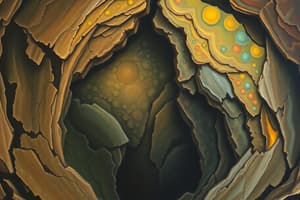Podcast
Questions and Answers
What is the approximate temperature of the hottest layer of the Earth?
What is the approximate temperature of the hottest layer of the Earth?
- 9000°C
- 6000°C
- 3000°C
- 5000°C (correct)
What is the approximate radius of the solid inner core of the Earth?
What is the approximate radius of the solid inner core of the Earth?
- 600 miles
- 1200 miles
- 1000 miles
- 760 miles (correct)
What is the main composition of the outer core of the Earth?
What is the main composition of the outer core of the Earth?
- Silicate material
- Nickel alloy
- Iron alloy
- Nickel-iron alloy (correct)
What is the layer of the Earth's mantle that is relatively soft and has a low resistance to plastic flow?
What is the layer of the Earth's mantle that is relatively soft and has a low resistance to plastic flow?
What is the term used to describe the outermost layers of the Earth's structure, bounded by the atmosphere above and the asthenosphere below?
What is the term used to describe the outermost layers of the Earth's structure, bounded by the atmosphere above and the asthenosphere below?
What is the term used to describe the process of the Earth's landscapes constantly changing?
What is the term used to describe the process of the Earth's landscapes constantly changing?
What type of climate is associated with a slow rate of weathering?
What type of climate is associated with a slow rate of weathering?
Which type of sediment has a larger surface area and therefore weathers at a faster rate?
Which type of sediment has a larger surface area and therefore weathers at a faster rate?
Which mineral is highly resistant to chemical and mechanical weathering?
Which mineral is highly resistant to chemical and mechanical weathering?
What feature of a rock influences the rate of weathering?
What feature of a rock influences the rate of weathering?
What is the shape of the slope of a river from its head to its mouth?
What is the shape of the slope of a river from its head to its mouth?
What is the term for the point where a river ends in a sea or lake?
What is the term for the point where a river ends in a sea or lake?
What is the definition of Geology?
What is the definition of Geology?
How do geologists contribute to civil engineering projects?
How do geologists contribute to civil engineering projects?
What is the focus of Physical Geology?
What is the focus of Physical Geology?
Which branch of geology deals with plate tectonics and Earth's movements?
Which branch of geology deals with plate tectonics and Earth's movements?
What does Crystallography focus on?
What does Crystallography focus on?
In what way does geology contribute to civil engineering construction?
In what way does geology contribute to civil engineering construction?
What is the definition of a mineral?
What is the definition of a mineral?
Why is the study of petrology important for civil engineering?
Why is the study of petrology important for civil engineering?
How does attrition contribute to river erosion?
How does attrition contribute to river erosion?
What is the focus of Structural Geology?
What is the focus of Structural Geology?
Which process uses weak carbonic acid to dissolve rock particles in rivers?
Which process uses weak carbonic acid to dissolve rock particles in rivers?
What is the main method by which river waves compress air in the cracks of rocks?
What is the main method by which river waves compress air in the cracks of rocks?
How are sedimentary rocks different from igneous and metamorphic rocks?
How are sedimentary rocks different from igneous and metamorphic rocks?
What is the term used for the fine particles of sand, silt, and clay that can remain suspended in the water?
What is the term used for the fine particles of sand, silt, and clay that can remain suspended in the water?
In which branch of geology would you study the ancient remains of plants and animals?
In which branch of geology would you study the ancient remains of plants and animals?
What is the process involved when eroded particles scrape against the rock, removing small pieces?
What is the process involved when eroded particles scrape against the rock, removing small pieces?
Why is the study of crystallography necessary to recognize minerals?
Why is the study of crystallography necessary to recognize minerals?
Which physical process is NOT involved in the formation of river valleys according to the text?
Which physical process is NOT involved in the formation of river valleys according to the text?
Flashcards are hidden until you start studying




